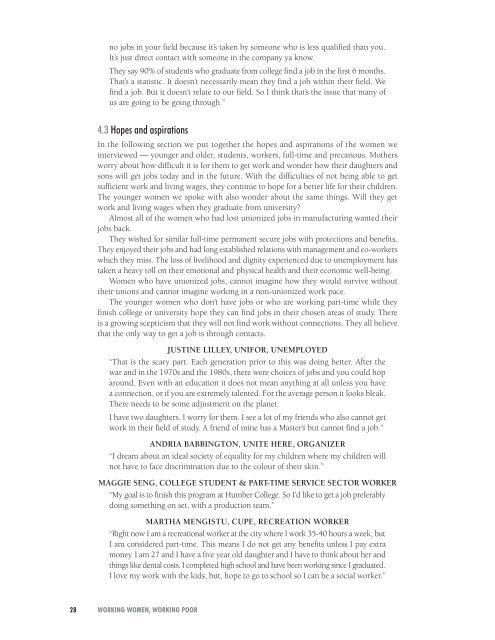workingwomenworkingpoor_letter_web
workingwomenworkingpoor_letter_web
workingwomenworkingpoor_letter_web
You also want an ePaper? Increase the reach of your titles
YUMPU automatically turns print PDFs into web optimized ePapers that Google loves.
no jobs in your field because it’s taken by someone who is less qualified than you.It’s just direct contact with someone in the company ya know.They say 90% of students who graduate from college find a job in the first 6 months.That’s a statistic. It doesn’t necessarily mean they find a job within their field. Wefind a job. But it doesn’t relate to our field. So I think that’s the issue that many ofus are going to be going through.”4.3 Hopes and aspirationsIn the following section we put together the hopes and aspirations of the women weinterviewed — younger and older, students, workers, full-time and precarious. Mothersworry about how difficult it is for them to get work and wonder how their daughters andsons will get jobs today and in the future. With the difficulties of not being able to getsufficient work and living wages, they continue to hope for a better life for their children.The younger women we spoke with also wonder about the same things. Will they getwork and living wages when they graduate from university?Almost all of the women who had lost unionized jobs in manufacturing wanted theirjobs back.They wished for similar full-time permanent secure jobs with protections and benefits.They enjoyed their jobs and had long established relations with management and co-workerswhich they miss. The loss of livelihood and dignity experienced due to unemployment hastaken a heavy toll on their emotional and physical health and their economic well-being.Women who have unionized jobs, cannot imagine how they would survive withouttheir unions and cannot imagine working in a non-unionized work pace.The younger women who don’t have jobs or who are working part-time while theyfinish college or university hope they can find jobs in their chosen areas of study. Thereis a growing scepticism that they will not find work without connections. They all believethat the only way to get a job is through contacts.JUSTINE LILLEY, UNIFOR, UNEMPLOYED“That is the scary part. Each generation prior to this was doing better. After thewar and in the 1970s and the 1980s, there were choices of jobs and you could hoparound. Even with an education it does not mean anything at all unless you havea connection, or if you are extremely talented. For the average person it looks bleak.There needs to be some adjustment on the planet.I have two daughters. I worry for them. I see a lot of my friends who also cannot getwork in their field of study. A friend of mine has a Master’s but cannot find a job.”ANDRIA BABBINGTON, UNITE HERE, ORGANIZER“I dream about an ideal society of equality for my children where my children willnot have to face discrimination due to the colour of their skin.”MAGGIE SENG, COLLEGE STUDENT & PART-TIME SERVICE SECTOR WORKER“My goal is to finish this program at Humber College. So I’d like to get a job preferablydoing something on set, with a production team.”MARTHA MENGISTU, CUPE, RECREATION WORKER“Right now I am a recreational worker at the city where I work 35-40 hours a week, butI am considered part-time. This means I do not get any benefits unless I pay extramoney. I am 27 and I have a five year old daughter and I have to think about her andthings like dental costs. I completed high school and have been working since I graduated.I love my work with the kids; but, hope to go to school so I can be a social worker.”28 WORKING WOMEN, WORKING POOR


